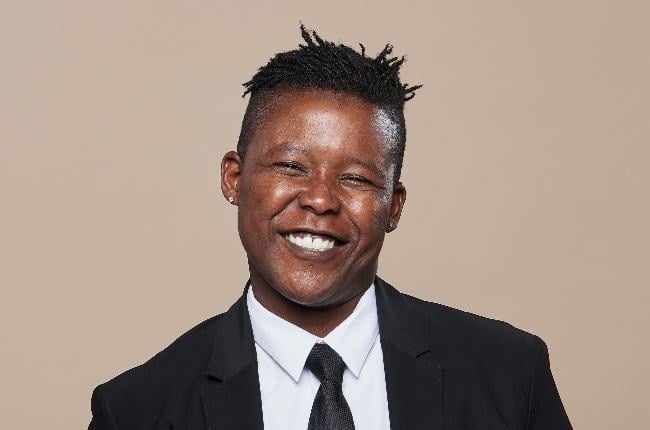
She is outspoken, fearless, and stands against any type of injustice, especially when it comes to her number one love, female football.
Africa’s most celebrated female football star Portia Modise tells Drum that being vocal has gotten her into serious trouble and cost her football career, but she refuses to be bullied and will continue to fight for women’s rights in football.
“I still maintain that female footballers are ill-treated and underpaid compared to the men and that's a fact,” she says.
She has always been vocal, ever since she joined Banyana Banyana as a 14-year-old.
"I started playing for Banyana Banyana. I saw the unfairness that was happening and started to fight,” she says.
“We were coached by Augusto Palacios and everyone was scared of him. We wore soccer boots that gave us blisters. All of us would complain to each other, we couldn’t take it to the technical team. When we went to the training sessions, we needed to be strong, and from then onwards, I realised that I will not be silenced, I will start speaking about issues affecting us as female footballers.”
Read more l Inside the life of TikToker Sima Mangolwane and her relationship with Ghost Hlubi
In May this year, she published her autobiography From Portia Modise with Love, an interactive book that tells her life story through multimedia content.
“My book is all about our struggles as female footballers. I am taking people on my journey. While they were seeing us on TV, all is going well, and we were supposedly getting [the same] as Bafana Bafana. I am talking about the places we used to sleep when travelling,” she says.
“I address how we would go and play overseas and get food poisoning, but we were asked not to talk about it. We nearly lost players who were in the hospital. People didn’t know about that at home. We were forced to play with those injuries.”
Growing up, Portia did not have many female role models, and this has pushed her to support other women and to want to be part of growing and developing young women from disadvantaged homes.
“I’d be lying if I said there were any specific women who I looked up to,” she says.
“Growing up in a disadvantaged home, I’m a woman, gay, and still trying to figure out what is going on with me. There was the expectation for me to have a boyfriend, get lobola and get married,” she says.
They say it takes a village to raise a child and Portia says she was raised by her community, and she struggled to find female mentors who believed in her and who she looked up to.
“These people with high expectations are the ones buying you things and they want to buy you a dress, but you want pants, and they continue to buy what they want. So, I had to fend for myself. I grew up in the streets. I am a child of the community,” she says.
“There are a lot of people who played different roles in my life while I was growing up; my coaches in the development space, my township. I had mothers, brothers, and fathers from different angles in my township.”
Portia says had she not had love from her community, she would not have made it.
“I would have probably been in jail or dead. Had it not been for football, I would have felt the pressure of poverty and I would probably be in jail by now. I was going to want to fit in.”
She is grateful for the sport.
“I thank God for choosing football, not knowing what it had planned for me. Our parents don't watch us, they don’t know the talent that we have, it's people from our communities who sit and watch us and know the talent and potential that we have,” she says.
“My mother was not sure if it was a good thing for me to play football. I don’t think I would have been where I am today if my parents raised me alone.”
Read more l Intermittent fasting pros and cons – who’s it for, why it works for some and not for others
Since Portia retired from football, she is still pursuing coaching.
“I stopped playing because I was too vocal and always advocating for women’s rights in football and that closed many doors for me,” she says.
“I started talking about things that people in power did not want to address and be exposed to, for example, them sleeping with female players, the gender-based violence within women’s football etcetera. When you start to voice those issues, you are a problem.”
Portia says she was told by football heads that she is a troublemaker.
“They said I need to stop playing now so that I can be celebrated or if I choose to carry on playing then I will not be celebrated, so I did,” she says.
“With coaching, I have done my courses. But even then, I still get problems as doors are closed for me. I am being sabotaged when trying to complete my coaching courses. They are the ones who are holding my qualifications. It is the powers that be that need to invite you to do the courses in order to qualify and it’s unfortunate that I have not been invited and instead they are inviting the puppets. It’s not easy and that is why I opened my foundation.”
The Portia Modise Foundation and Academy is a non-profit, Women’s Football Development and training academy that aims to uplift communities by powering women through life skills.
“Once I get all the required licenses, I will be able to see my dream through.”
When Banyana Banyana won the Women’s Africa Cup of Nations title by beating hosts Morocco, Portia was ecstatic.
“I am happy that they won, but our fight is not over. This was the beginning. Women’s football is not being fixed. We still have a long way to go. We still don’t have a professional league and do not have equal pay for male footballers. Men are getting everything, national team, and at club level, they get paid,” she says.
“When I saw Banyana Banyana win, I was emotional. All these years in my career, this is what I have been chasing, thinking that if I get this, I will earn my respect. When I see these girls are still not getting what they deserve and people are debating what these girls should be earning, it pains me.”
Without comparing whether the women’s team is better than the men’s, Portia says both teams deserve equal treatment.
“I don’t want to compare. We are not a nation that needs to be fighting and competing. When Bafana play, we need to be there to support our brothers and they need to do the same for Banyana Banyana. But the leadership is so poor and makes us compare and fight. I need to be happy for both teams.”
While playing for Banyana Banyana Portia says she was still living in a shack and earning R50.
“I stopped living in a shack when I won the Sports star of the year seven years go. Without me being the Sports Star of the Year, I would still be living in a shack. When Fikile Mbalula gave me the R1 million, half of it needed to go to my charity of choice, which I still have not received to this day. The charity must think that I am a horrible person, and I ate the money. I promised them the money and I am still fighting to get that money for the charity,” she says.
“When I ask about it, no one wants to talk to me because I am the rebellious Portia Modise,” she says.



















